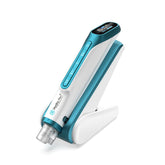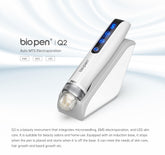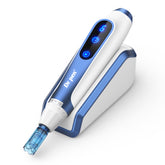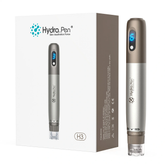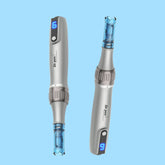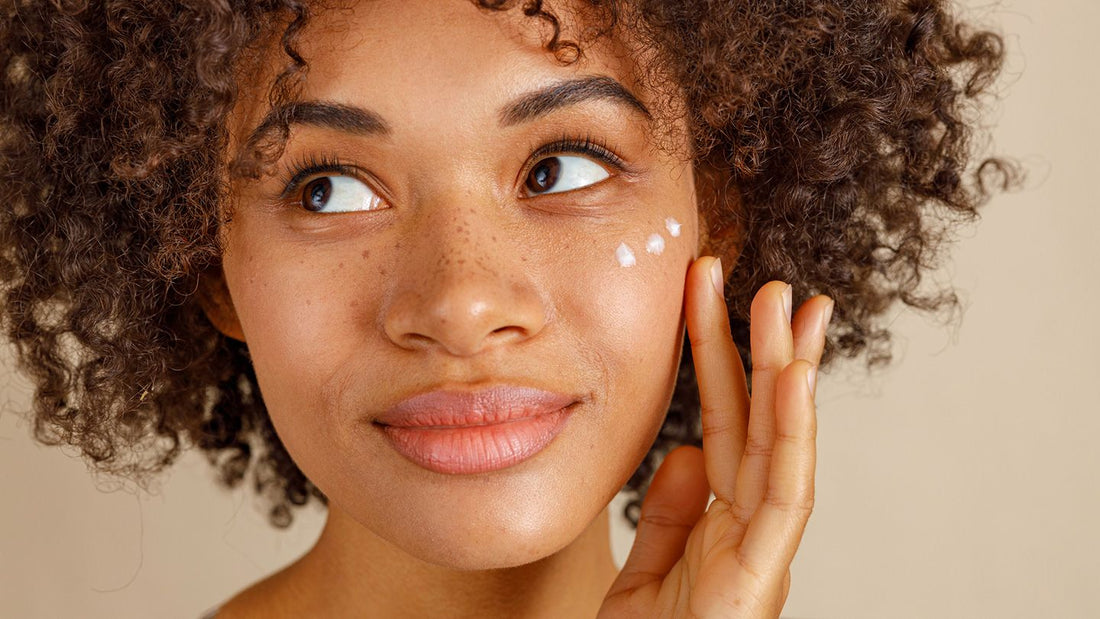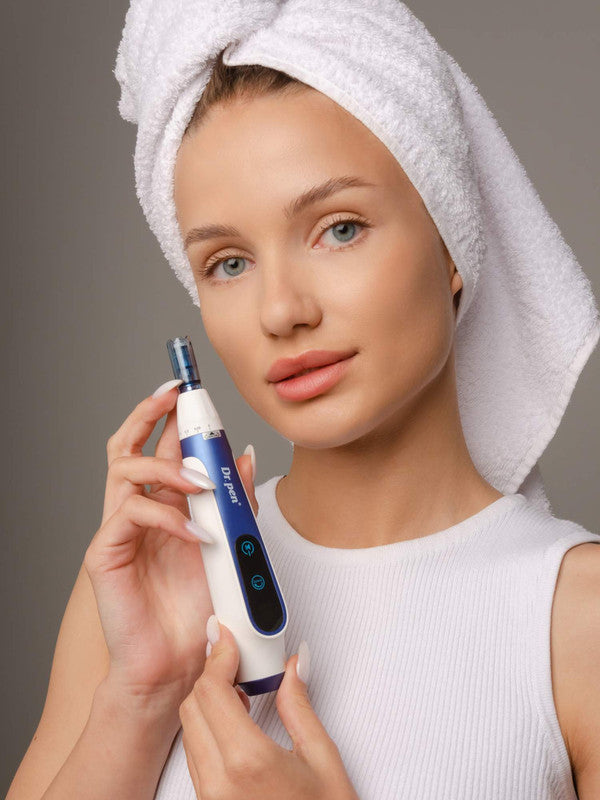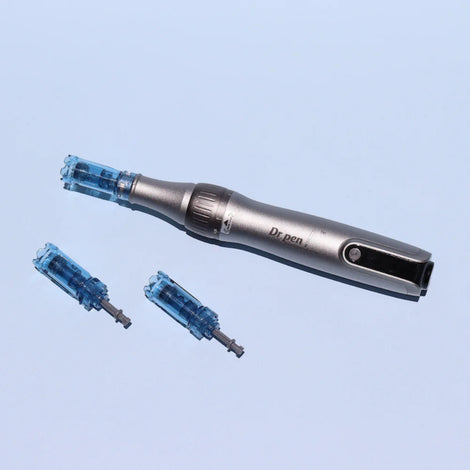Do you have dark spots or pigment sections on your face? Don't stress - you're not alone!
Many people want to know how to treat dark spots. Pigmentation and hyperpigmentation are very common and affect many people for a variety of reasons, which can include hormonal changes, sun exposure, skin damage, or genetics.
Most hyperpigmentation is usually harmless, but if it bothers you or hyperpigmentation hyperpigmentation spots and even if you prefer to go don't be afraid because there are treatments that can be applied to significantly resolve Dodge.
WHAT IS HYPERPIGMENTATION?
Most of us will experience hyperpigmentation on our face or body at some point in our lives. Hyperpigmentation appears as spots, the color of which can vary from pale reddish white to dark brownish black, depending on your skin tone.
What are the main causes of hyperpigmentation?
Hyperpigmentation can make the skin look uneven and sun-damaged, or it can make you look older by giving the skin a dull, weathered tone.
Pigmentation is caused by excessive production of pigment in the skin, which gives it a brown color - melanin.
Melanin is produced by special skin cells known as melanocytes - their sole job is to produce melanin, which absorbs and scatters the harsh UV rays of the sun. It does this to protect skin cells from damage.
Which skin types are more susceptible to hyperpigmentation?
The more sunlight you are exposed to, the more melanin your body will try to produce as a defense response. For this reason, people who have lived in sunny climates for generations will sometimes have darker skin than those who live in cooler climates.
When in direct sunlight, sometimes our melanocytes can behave abnormally, multiply and distribute melanin unevenly. This results in spots or patches of melanin, which we know as hyperpigmentation.
Hyperpigmentation is more common in people who are exposed to irregular sunlight - for example, if you don't spend much time outdoors, but spend all day at the barbecue and get sunburned, you're more likely to experience hyperpigmentation as a result of sunburn. more often, even improvement compared to someone exposed to the sun.
WHAT DOES HYPERPIGMENTATION LOOK LIKE?
There are three main types of hyperpigmentation that we list below - and they all have slightly different appearances.
1. Post-inflammatory hyperpigmentation (PIH)
PIH is a discoloration of the skin (anywhere on the face or body) in response to a wound, a rash, or sometimes a pimple. Melanin is produced when the skin heals, so sometimes when the skin is exposed to a trauma and heals, it leaves traces behind. The PIH can be Deciphered between white, pink / red, purple, brown or black, depending on your skin tone.
2. Freckle
Sunspots are the most common cause of hyperpigmentation and are caused by the body trying to defend itself against the harmful UV rays of the sun. They tend to be on the parts of your face and body that are most exposed to the sun, and they can be black, brown, or gray. They usually look like spots or freckles.
As is commonly seen in the elderly, they are also known as ‘age spots’ and ‘liver spots’.
3. Melasma
Melasma is caused by your body's response to hormonal changes in your body - melasma is very common during pregnancy and also occurs in women who use hormonal-based birth control methods. Melasma causes the skin to form black or brown spots, usually on the face and stomach.
Regardless of the type of hyperpigmentation you experience, it's always best to make sure you consult your healthcare provider if you have any concerns.
HOW LONG DOES IT TAKE FOR HYPERPIGMENTATION TO GO AWAY?
If you're wondering how long you'll be stuck with your hyperpigmentation, the good news is that it usually disappears. Over time, the appearance of discoloration will gradually decrease - this occurs when the skin heals and melanin begins to be absorbed into the surrounding tissue.
How long hyperpigmentation will last varies - this can take from a few months (for example, in the case of minor skin trauma) or even up to several years.
Likewise, some cases of hyperpigmentation will disappear completely and others will disappear up to a certain point, then stop there.
The time required for hyperpigmentation to fade depends on:
Portrait of a young woman with fair skin and freckles
HOW DO YOU PREVENT HYPERPIGMENTATION?
Prevention is always better than cure - but in many cases of hyperpigmentation (such as hormonally caused hyperpigmentation), keeping it at bay is not within our 100% control.
When it comes to preventing almost all skin care worries - apply sunscreen! Melanin melanin absorbs the harmful UV rays of the sun and, as a result, acquires an increasingly specific meaning, freckles, age spots and damaged skin can become more noticeable when exposed to the sun.
Opt for a broad-spectrum sunscreen that will block UVA and UVB rays and will not be less than SPF30 +.
WHAT ARE THE TREATMENTS FOR HYPERPIGMENTATION?
Whether you are experiencing hyperpigmentation caused by sun exposure, hormonal changes, skin trauma or acne - there are three main treatments:
Antioxidant-rich vitamin C is a free radical neutralizer that protects your skin from harmful atmospheric elements that can contribute to the darkening of hyperpigmentation. Vitamin C serum also helps to stabilize the skin after injuries caused by UV and infrared light and brightens the entire skin.
And as a bonus, the vitamin C serum helps fight fine lines and smoothes the texture. October is a great October addition to your skincare routine.
Our top tip: Try mixing a small amount of Vitamin C serum with your fave liquid foundation - this will give your foundation a dewy, natural coverage and give you a beautiful glow while protecting your skin (don't forget the spf too).
Retinol is another great anti-aging powerhouse that comes with hyperpigmentation reducing benefits. Retinol serum not only helps to speed up the cell cycle, but also penetrates deep into the skin to block the production cycle of hyperpigmentation. This means that it is great for treating dark spots that go beyond the surface of the skin.
Our retinol serum is available in our Anti-Ageing triple serums (they also contain Vitamin C if you want to try both).
Other active ingredients that can help accelerate the fading of hyperpigmentation by increasing the cell cycle are Alpha Hydroxy and Beta Hydroxy Acids (ahas and bhas), glycolic acid and kojic acid, all of which are classified as chemical exfoliants.
Physical exfoliation is another way to help reduce the appearance of hyperpigmentation. Chemical peels and laser treatments can be used to improve the appearance of hyperpigmentation from the dermatologist's clinic.
And, of course,... microneedle to the rescue! Microneedling is great for reducing the appearance of hyperpigmentation, with research supporting its effectiveness. Microneedling stimulates cell regeneration, and since cell regeneration can treat dark spots, microneedling is incredibly effective in getting rid of hyperpigmentation.
Among the pen micro-needle pen model, which Dr. Dec.'yi will you choose? Range This handy comparison guide eliminates some of the differences.
Key takeaways:
Sun protection is very important to prevent hyperpigmentation - but not all hyperpigmentation can be prevented
Some skin types are more susceptible to hyperpigmentation than others
Hyperpigmentation is very treatable with treatments such as microdermabrasion October in addition to chemical and physical exfoliants
Always check skin blemishes with your healthcare professional if you are concerned
For topical treatments, try vitamin C serum and Retinol serum to boost cell cycle
Are you experiencing hyperpigmentation or do you have a hyperpigmentation experience that you would like to share? Join our Instagram Support Group.
There you will find a community of beauty and skincare lovers in the UK sharing their travels, tips and experiences. Our in-house Beauty Consultant is also in the group, answering your questions!
Many people want to know how to treat dark spots. Pigmentation and hyperpigmentation are very common and affect many people for a variety of reasons, which can include hormonal changes, sun exposure, skin damage, or genetics.
Most hyperpigmentation is usually harmless, but if it bothers you or hyperpigmentation hyperpigmentation spots and even if you prefer to go don't be afraid because there are treatments that can be applied to significantly resolve Dodge.
WHAT IS HYPERPIGMENTATION?
Most of us will experience hyperpigmentation on our face or body at some point in our lives. Hyperpigmentation appears as spots, the color of which can vary from pale reddish white to dark brownish black, depending on your skin tone.
What are the main causes of hyperpigmentation?
Hyperpigmentation can make the skin look uneven and sun-damaged, or it can make you look older by giving the skin a dull, weathered tone.
Pigmentation is caused by excessive production of pigment in the skin, which gives it a brown color - melanin.
Melanin is produced by special skin cells known as melanocytes - their sole job is to produce melanin, which absorbs and scatters the harsh UV rays of the sun. It does this to protect skin cells from damage.
Which skin types are more susceptible to hyperpigmentation?
The more sunlight you are exposed to, the more melanin your body will try to produce as a defense response. For this reason, people who have lived in sunny climates for generations will sometimes have darker skin than those who live in cooler climates.
When in direct sunlight, sometimes our melanocytes can behave abnormally, multiply and distribute melanin unevenly. This results in spots or patches of melanin, which we know as hyperpigmentation.
Hyperpigmentation is more common in people who are exposed to irregular sunlight - for example, if you don't spend much time outdoors, but spend all day at the barbecue and get sunburned, you're more likely to experience hyperpigmentation as a result of sunburn. more often, even improvement compared to someone exposed to the sun.
WHAT DOES HYPERPIGMENTATION LOOK LIKE?
There are three main types of hyperpigmentation that we list below - and they all have slightly different appearances.
1. Post-inflammatory hyperpigmentation (PIH)
PIH is a discoloration of the skin (anywhere on the face or body) in response to a wound, a rash, or sometimes a pimple. Melanin is produced when the skin heals, so sometimes when the skin is exposed to a trauma and heals, it leaves traces behind. The PIH can be Deciphered between white, pink / red, purple, brown or black, depending on your skin tone.
2. Freckle
Sunspots are the most common cause of hyperpigmentation and are caused by the body trying to defend itself against the harmful UV rays of the sun. They tend to be on the parts of your face and body that are most exposed to the sun, and they can be black, brown, or gray. They usually look like spots or freckles.
As is commonly seen in the elderly, they are also known as ‘age spots’ and ‘liver spots’.
3. Melasma
Melasma is caused by your body's response to hormonal changes in your body - melasma is very common during pregnancy and also occurs in women who use hormonal-based birth control methods. Melasma causes the skin to form black or brown spots, usually on the face and stomach.
Regardless of the type of hyperpigmentation you experience, it's always best to make sure you consult your healthcare provider if you have any concerns.
HOW LONG DOES IT TAKE FOR HYPERPIGMENTATION TO GO AWAY?
If you're wondering how long you'll be stuck with your hyperpigmentation, the good news is that it usually disappears. Over time, the appearance of discoloration will gradually decrease - this occurs when the skin heals and melanin begins to be absorbed into the surrounding tissue.
How long hyperpigmentation will last varies - this can take from a few months (for example, in the case of minor skin trauma) or even up to several years.
Likewise, some cases of hyperpigmentation will disappear completely and others will disappear up to a certain point, then stop there.
The time required for hyperpigmentation to fade depends on:
- Type / severity of trauma before hyperpigmentation develops
- The original cause of the discoloration
- Your skin tone
- Your skin, how do you cure
- Although the cause may be your hyperpigmentation, you can take good care of your skin to improve your body's natural ability to heal itself.
Portrait of a young woman with fair skin and freckles
HOW DO YOU PREVENT HYPERPIGMENTATION?
Prevention is always better than cure - but in many cases of hyperpigmentation (such as hormonally caused hyperpigmentation), keeping it at bay is not within our 100% control.
When it comes to preventing almost all skin care worries - apply sunscreen! Melanin melanin absorbs the harmful UV rays of the sun and, as a result, acquires an increasingly specific meaning, freckles, age spots and damaged skin can become more noticeable when exposed to the sun.
Opt for a broad-spectrum sunscreen that will block UVA and UVB rays and will not be less than SPF30 +.
WHAT ARE THE TREATMENTS FOR HYPERPIGMENTATION?
Whether you are experiencing hyperpigmentation caused by sun exposure, hormonal changes, skin trauma or acne - there are three main treatments:
- Physical peeling
- Chemical peeling
- Brightening active ingredients
- When it comes to illuminating active ingredients, vitamin C serum is one of the best places to start.
Antioxidant-rich vitamin C is a free radical neutralizer that protects your skin from harmful atmospheric elements that can contribute to the darkening of hyperpigmentation. Vitamin C serum also helps to stabilize the skin after injuries caused by UV and infrared light and brightens the entire skin.
And as a bonus, the vitamin C serum helps fight fine lines and smoothes the texture. October is a great October addition to your skincare routine.
Our top tip: Try mixing a small amount of Vitamin C serum with your fave liquid foundation - this will give your foundation a dewy, natural coverage and give you a beautiful glow while protecting your skin (don't forget the spf too).
Retinol is another great anti-aging powerhouse that comes with hyperpigmentation reducing benefits. Retinol serum not only helps to speed up the cell cycle, but also penetrates deep into the skin to block the production cycle of hyperpigmentation. This means that it is great for treating dark spots that go beyond the surface of the skin.
Our retinol serum is available in our Anti-Ageing triple serums (they also contain Vitamin C if you want to try both).
Other active ingredients that can help accelerate the fading of hyperpigmentation by increasing the cell cycle are Alpha Hydroxy and Beta Hydroxy Acids (ahas and bhas), glycolic acid and kojic acid, all of which are classified as chemical exfoliants.
Physical exfoliation is another way to help reduce the appearance of hyperpigmentation. Chemical peels and laser treatments can be used to improve the appearance of hyperpigmentation from the dermatologist's clinic.
And, of course,... microneedle to the rescue! Microneedling is great for reducing the appearance of hyperpigmentation, with research supporting its effectiveness. Microneedling stimulates cell regeneration, and since cell regeneration can treat dark spots, microneedling is incredibly effective in getting rid of hyperpigmentation.
Among the pen micro-needle pen model, which Dr. Dec.'yi will you choose? Range This handy comparison guide eliminates some of the differences.
Key takeaways:
Sun protection is very important to prevent hyperpigmentation - but not all hyperpigmentation can be prevented
Some skin types are more susceptible to hyperpigmentation than others
Hyperpigmentation is very treatable with treatments such as microdermabrasion October in addition to chemical and physical exfoliants
Always check skin blemishes with your healthcare professional if you are concerned
For topical treatments, try vitamin C serum and Retinol serum to boost cell cycle
Are you experiencing hyperpigmentation or do you have a hyperpigmentation experience that you would like to share? Join our Instagram Support Group.
There you will find a community of beauty and skincare lovers in the UK sharing their travels, tips and experiences. Our in-house Beauty Consultant is also in the group, answering your questions!




